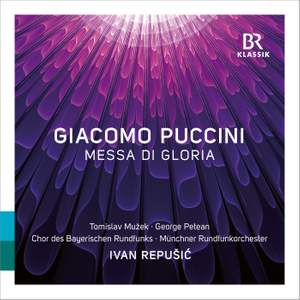Puccini's "Messa di Gloria" is one of the most popular settings of the Latin Mass and can also be found on many concert programmes in the Puccini year 2024. The musical quality, energy and freshness of this youthful work ensured its steadily growing popularity after its rediscovery in the early 1950s. The composer even quoted some of the melodies later in his famous operas, particularly in "Manon Lescaut". The "Messa di Gloria" was performed very recently on June 27, 2024 in the Herz-Jesu-Kirche in Munich by the Bavarian Radio Chorus and the Münchner Rundfunkorchester under its chief conductor Ivan Repušić.
To mark the 100th anniversary of the great Italian composer's death, BR-KLASSIK is now presenting the live recording of this outstanding concert on CD. Giacomo Puccini wrote his "Messa a quattro voci con orchestra" ("Mass for four voices with orchestra") between 1878 and 1880 as the final thesis of his music studies in his hometown of Lucca. The first preparatory work was done when he was only eighteen, and the young composer was just 21 years old when the work was first performed on July 12, 1880. The mass remained unpublished during his lifetime but became immensely popular after its rediscovery in the early 1950s. However, it was inaccurately labelled "Messa di Gloria" in the first printed edition and at later performances, a term that in fact refers to a (usually shorter) composition consisting solely of Kyrie and Gloria; Puccini's mass is in fact a full-fledged work, the complete setting of the Latin Ordinary with Kyrie, Gloria, Credo, Sanctus/Benedictus and Agnus Dei. Puccini had begun his work on the Credo as early as 1878. In the "Messa di Gloria", the choir takes centre stage with melodies that become increasingly beautiful; the solo parts for tenor and baritone are sung by Tomislav Mužek and George Petean. The approximately 45-minute-long work is complemented on this CD by Puccini's orchestral works "Preludio sinfonico" and "Crisantemi" - the latter in the arrangement for string orchestra by Lucas Drew.





